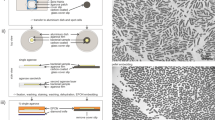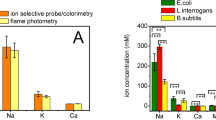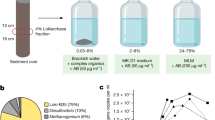Abstract
IT has been reported1,2 that various Gram-positive micro-organisms may be converted into Gram-negative cytoskeletons by extraction with 2 per cent sodium cholate at 60° C. The extract from Clostridium welchii, for example, contained mainly magnesium ribonucleate, deoxyribonucleic acid and polysaccharide, while the extract from Saccharomyces cerevisiæ was composed chiefly of polysaccharide and magnesium ribonucleate. Cytoskeletons so rendered Gram-negative could be reconverted to Gram-positive forms by treatment under reducing conditions with the cholate extract. The essential component in this replating process was magnesium ribonucleate, and it was shown that magnesium ribonucleate from a variety of sources could be replated on to reduced cytoskeletons of yeast or Cl. welchii. When Gram-positive cells were converted into Gram-negative forms by autolysis, the resulting cytoskeletons could not be replated by magnesium ribonucleate. Short autolytic processes were found to result in the liberation into solution of an essentially intact magnesium ribonucleoprotein which possessed the staining properties of the Gram-positive cells themselves. The nucleoprotein could be dissociated into magnesium ribonucleate and a protein—neither of which separately possessed the property of being able to retain the Gram stain, but which, upon recombination under reducing conditions, formed a complex which stained intensely Gram-positive. In the light of these results, it was suggested that an essential part of the Gram complex is a magnesium ribonucleoprotein. Numerous confirmations of these claims and techniques have been received3,4,5 from workers in various parts of the world, though recently Mitchell and Moyle6 prefer to regard the essential part of the Gram complex as a hypothetical “X/P factor”. However, inasmuch as the results of Mitchell and Moyle show no content of this as yet ill-defined X/P factor in Cl. welchii, which is one of the most intensely staining Gram-positive organisms, we find it difficult to accept their assumption that this factor is an essential component of the Gram complex.
This is a preview of subscription content, access via your institution
Access options
Subscribe to this journal
Receive 51 print issues and online access
$199.00 per year
only $3.90 per issue
Buy this article
- Purchase on Springer Link
- Instant access to full article PDF
Prices may be subject to local taxes which are calculated during checkout
Similar content being viewed by others
References
Henry, H., and Stacey, M., Proc. Roy. Soc., B., 133, 391 (1946).
Henry, H., Stacey, M., and Teece, E. G., Nature, 156, 720 (1945).
Bartholomew, J. W., and Umbreit, W. W., J. Bact., 48, 567 (1944).
Bartholomew, J. W., J. Bact., 51, 584 (1946).
Michelazzi, L., and others (private communication).
Mitchell, P., and Moyle, J., Nature, 166, 218 (1950).
Webb, M., J. Gen. Microbiol., 2, 260 (1948).
Author information
Authors and Affiliations
Rights and permissions
About this article
Cite this article
JONES, A., MUGGLETON, P. & STACEY, M. The Gram Complex in Clostridium welchii. Nature 166, 650–651 (1950). https://doi.org/10.1038/166650a0
Issue Date:
DOI: https://doi.org/10.1038/166650a0
Comments
By submitting a comment you agree to abide by our Terms and Community Guidelines. If you find something abusive or that does not comply with our terms or guidelines please flag it as inappropriate.



